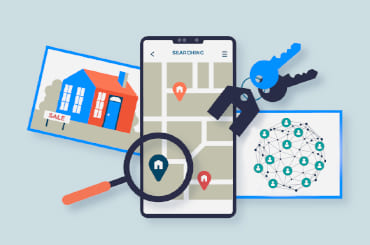
Will real estate boom again? The question is in the investor’s minds, especially when COVID-19 hits hard all around the globe. While technology has been the prime motivation that keeps the economy running, the real-estate sector seems to be running behind. They lack new ideas because of the old ways of doing business, which is offline.
A situation that we get forced to live. But many are adapting to this way of life. Given the scope of digital marketing, real estate companies can become a new pacesetter for the coming years. Only a few aspects of this industry have been digital, and there is still room for improvement.
The innovation with the usage of technology can make it an easy process to start a new chapter. By developing real estate websites and dedicated apps, we can bring the firms to new heights.
Since the pandemic is playing a see-saw game, we can use this in developing software that can be more than a home video. With the help of digital marketing companies, you can showcase the industry to new highlights that can make online dealings a true success.
Future of Real Estate Business in India:
With the help of new technology, the real estate industry can gain many investors and buyers. The tech-savvy aspects include- blockchain, AR/VR, AI, and APIs. By using these next-gen facilities, user-friendly software can get developed for better search of homes.
The real estate business can become contactless in the techno-friendly mode of viewing a property, rented homes, and virtual meetings. Not only customer’s experience will be smoother, but it can also save much time and effort. Earlier the norm of visiting a location takes time and personal expense. But now, all these processes get simplified through app development or software.
Let us get into the promising solutions that technologies offer during the coronavirus crisis:
Use of AI:
In this digital era, automation is the new normal, filling the gap for businesses, old and new. The arrival of automation to new sectors has been a success and whoever was first to take this step forward has increased turnover. It is the automation of business practices that have simplified the work to make it a rewarding experience. The areas of automation include:
- Use of existing data to target the accurate market or customers base
- Real estate website for lead generation
- Automates tasks and transaction
- Email marketing and leads through automated workflows
- Automation in accounting and finances
- Virtual property viewing
- Use of Omni-channels for syncing of the leads
Use of Blockchain:
The real estate business in India is a complex process as most of the work is still done on a traditional setup. It refers to the use of offline mode, lots of paperwork, and manual handling. Plus, there are multiple stakeholders involved in this making it a long and tedious task. This takes most of the time in creating a database, for efficient software aims to solve this issue.

To solve these issues, the use of blockchain in handling property transactions can be a game-changer. Real estate mobile app developers can work on the foundation of blockchain technology to make contracts management a simple process. On similar lines, the lease agreements and maintenance requests can get readily checked.
There is no chance of human error as the deed paperwork plus its management gets backed up by blockchain. If there is any defect and illegal movement in the deed process, then the property owners are wholly responsible. It can also get tracked because the applications made by real estate developers are transparent and accurate.
Use of virtual tours:
Real estate economics demands innovation from existing home videos and images contents. The recent technologies are going beyond video conferencing tools and 2D photographs. Virtual showings allow for more flexibility for property hunting, especially for far-off areas. A dedicated mobile solution is a way better option in getting more leads. It offers ample time for both buyers and sellers by scheduling meetings in advance.
Contemporary apartment hunting involves spending money from both sides on travel. As buyers take their time before paying any amount, so most of the work should get done virtually. It involves payment, all the paperwork to meetings, and the handover part. Here, verifying the documents also gets simplified.
Real-time work:

Moving forward to a new technological era means trying to do away with paperwork. It’s a step towards saving time and a robust model of securing crucial data. The paper model is not reliable since the information can get lost by human mismanagement. The reliance on paperwork limits the business functions to the mere office because it is not durable. And for large databases, it fails to serve its purpose.
For big businesses having software can help do most of the tasks that involve identification of buyer/seller database. Here, cloud adoption is the best strategy for making the real estate business a success. The use of disruptive technology can help store information with little operational costs.
With modern software solutions via the website and mobile application, your business gets an edge. The property hunting process gets simplified too. To develop the best and workable apps that are result-oriented and can connect to the target customers, you need a state-of-the-art solution. Infoneo technologies in this domain can help your business grow. They have expertise in bridging the technological gaps that exist in the real estate market. Real estate agents in India are following the same old rules of doing business. But keeping this human part, inclusive the industry needs to adopt modern technology.



